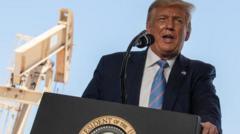This website uses cookies so that we can provide you with the best user experience possible. Cookie information is stored in your browser and performs functions such as recognising you when you return to our website and helping our team to understand which sections of the website you find most interesting and useful.


US President-elect Donald Trump has once again threatened to impose substantial tariffs on Canada saying he intended to use "economic force" to acquire its neighbour to the north.
While ruling out use of military force to do so, he reiterated his threat to impose a 25% tariff on Canadian and Mexican goods unless both countries took steps to increase security on their shared US borders.
Trump has in recent weeks repeatedly needled Canada about it becoming the 51st US state.
"Canada and the United States, that would really be something," Trump said. "You get rid of that artificially drawn line, and you take a look at what that looks like, and it would also be much better for national security."
Economists warn that if Trump follows through on imposing the tariffs after he is inaugurated on 20 January, it would significantly hurt Canada's economy.
Trump also raised concerns about Canada's military spending.
"They don't essentially have a military. They have a very small military. They rely on our military. It's all fine, but, you know, they got to pay for that. It's very unfair," he said on Tuesday, speaking from his Mar-a-Lago resort in Florida
Canada has been under pressure to increase its military spending as it continues to fall short of the target set out for Nato members.
Its defence budget currently stands at C$27bn ($19.8bn, £15.5bn), though the Trudeau government has promised in its most recent budget that it will boost spending to almost C$50bn by 2030.
Trump also reiterated his concerns about drugs crossing the borders of Mexico and Canada into the US.
The number of crossings at the US-Canada border is significantly lower than at the southern border, according to US Border Patrol data on migrant encounters, as is the amount of fentanyl seized.
Canada has recently promised to implement a set of sweeping new security measures along the US border, including strengthened surveillance and a joint "strike force" to target transnational organised crime.
The Trudeau government has said it is considering imposing counter-tariffs if Trump follows through on the threat.
On Monday, Doug Ford, the leader of Canada's most populous province, told the BBC he did not disagree with some of Trump's demands.
"I agree with them that we have to tighten up the borders on both sides of the borders. I've been saying that for years," the Ontario premier said.
"I believe we should meet our 2% Nato commitment as well - but we should have fair trade right now."
The ongoing tariff threat comes at a politically challenging time for Canada.
On Monday, an embattled Trudeau resigned, though he will stay on as prime minister until the governing Liberals elect a new leader, expected sometime by late March.
Ford said the outgoing prime minister must spend his remaining weeks in office working with the provinces to address Trump's threat.
"The premiers are leading the country right now," he said.
Ontario has a deep reliance on trade with the US. The province is at the heart of the highly integrated auto industry in Canada, and trade between Ontario and the US totalled more than C$493bn ($350bn) in 2023.
The premier warned "we will retaliate hard" if the Trump administration follows through, and highlighted the close economic ties between the two nations, including on energy.
The US relies "on Ontario for their electricity. We keep the lights on to a million and a half homes and businesses in the US", he said.
At a press conference early this week, Ford also pushed back on Trump's 51st state comments.
"I'll make him a counter-offer. How about if we buy Alaska and we throw in Minneapolis and Minnesota at the same time?" Ford said.
"It's not realistic."



 Africana55 Radio
Africana55 Radio 
